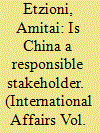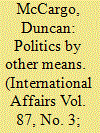|
|
|
Sort Order |
|
|
|
Items / Page
|
|
|
|
|
|
|
| Srl | Item |
| 1 |
ID:
105447


|
|
|
|
|
| Publication |
2011.
|
| Summary/Abstract |
Western geopolitical discourse misrepresents and constructs Central Asia as an inherently and essentially dangerous place. This pervasive 'discourse of danger' obscures knowledge of the region, deforms scholarship and, because it has policy implications, actually endangers Central Asia. This article identifies how the region is made knowable to a US-UK audience through three mutually reinforcing dimensions of endangerment: Central Asia as obscure, oriental, and fractious. This is evidenced in the writings of conflict resolution and security analysts, the practices of governments, the activities of international aid agencies and numerous lurid films, documentaries and novels. The article first establishes the tradition of inscribing danger to Central Asia, in both academic and policy discourse, from the colonial experience of the nineteenth century through to the post-Soviet transition and subsequent considerations of the region in terms of the war on terror. It considers several examples of this discourse of danger including the popular US TV drama about presidential politics, The West Wing, the policy texts of 'Washingtonian security analysis' and accounts of danger, insecurity and urban violence in the Ferghana Valley. It is argued that popular policy and academic texts are relatively consistent across the three dimensions of endangerment. This argument is demonstrated through a discussion of how policy-making and practice is informed by this discourse of danger and of how the discourse of danger is contested within the region. The example of urban violence in Osh, Kyrgyzstan and Jalalabad, Afghanistan in 2010 demonstrates how opportunities to mitigate conflict may have been lost due to the distortions of this discourse of danger. It concludes by raising the challenge to policy-makers, journalists and academics to contest this western geopolitical discourse and provide better accounts of how danger is experienced by Central Asians.
|
|
|
|
|
|
|
|
|
|
|
|
|
|
|
|
| 2 |
ID:
105451


|
|
|
|
|
| Publication |
2011.
|
| Summary/Abstract |
Evidence suggests that a lack of effective checks and balances against corruption undermines the rule of law, the protection of human rights and economic growth in sub-Saharan Africa. This article suggests the need for an international treaty to establish an African commission against corruption, involving United Nations inspectors to investigate and prosecute corruption. A range of evidence is reviewed suggesting that pressure from constituents as well as international organizations may be effective in compelling African leaders to sign this type of protocol.
|
|
|
|
|
|
|
|
|
|
|
|
|
|
|
|
| 3 |
ID:
105454


|
|
|
|
|
| Publication |
2011.
|
| Summary/Abstract |
Divided cities within contested states are a category in their own right, in that their division is driven by issues of national sovereignty as well as ethnic, religious and linguistic cleavages. Reconstituting them as integrated urban spaces, therefore, requires policy shifts on many levels-local, municipal and state-but too often these are hampered by fears of loss of sovereignty and external domination. The case of Jerusalem in the Palestinian-Israeli conflict is a prime example of how national sovereignty issues can be seen as having an impact upon urban divisions. One option that is proposed for the resolution of this conflict, which has generated intense debate on both sides, is that of a binational Israeli-Palestinian state. This article argues that there is a false dichotomy concerning the competing benefits of binational and two-state models in the Palestinian-Israeli conflict. It contends, on the one hand, that the binational model comprises many forms, some of which are more confederal in structure. On the other hand, for the two state model to function effectively a high degree of interstate coordination is required which brings it close to some forms of confederalism. The article examines the discussions on divided Jerusalem to explore this argument and highlights the degree of interstate coordination that is required if any of the plans being put forward for the future of the city are to work. It concludes by relating the Jerusalem example to the wider issue of divided cities in contested states.
|
|
|
|
|
|
|
|
|
|
|
|
|
|
|
|
| 4 |
ID:
105436


|
|
|
|
|
| Publication |
2011.
|
| Summary/Abstract |
The Great Recession has brought a structural break in international economic and political order. The geography of power is at present being dramatically transformed, notably by the rapid economic rise of China. What makes international order legitimate in a world in which political and economic foundations are rapidly shifting? This article examines analogies and lessons from a previous transition, from a world order centered on Britain, to a US dominated global order. That transition saw two moments of crisis, or turning points, the 1931 financial crisis at the height of the Great Depression, and the diplomatic and military catastrophe of Suez. The article looks at two interpretations of the transition, one by E. H. Carr focusing on the destruction in the Great Depression of a liberal economic and political order and its replacement by a world of brutal Great Power politics; the other by Charles Kindleberger, stressing the need for a benevolent hegemonic power to provide public goods for the world economy and the world political system. China is beginning to behave in the way expected of a Kindleberger hegemon, but also sees the possibilities of asserting power in a world that in the aftermath of 2008 looks much more like the chaotic and crisis-ridden interwar period as interpreted by E. H. Carr. The challenge for the management of the new international order will lie in the ability of China to embrace the universalistic vision that underpinned previous eras of stability, in the nineteenth century and in the late twentieth century.
|
|
|
|
|
|
|
|
|
|
|
|
|
|
|
|
| 5 |
ID:
105437


|
|
|
|
|
| Publication |
2011.
|
| Summary/Abstract |
Whether China is a responsible stakeholder is evaluated from employing three sets of standards: normative, 'aspirational' standards (i.e. those that make a good community member and an upstanding citizen); rational choice (is China acting in line with shared or complementary self-interest?); and power analysis (whether China is upsetting an established world order or contributing to the formation of a new one?). In the process, this article examines both China and the standards themselves.
|
|
|
|
|
|
|
|
|
|
|
|
|
|
|
|
| 6 |
ID:
105448


|
|
|
|
|
| Publication |
2011.
|
| Summary/Abstract |
This article argues that more emphasis should be placed on the political aspects of international tribunals, which are often in the business of reshaping politics as well as simply administering justice. By examining the hybrid Extraordinary Chambers in the Courts of Cambodia (ECCC), popularly known as the Khmer Rouge Tribunal, the article develops arguments previously advanced by Victor Peskin in respect of Rwanda and the former Yuogoslavia. Peskin has suggested that courtroom war crimes trials are paralleled by 'virtual trials', in which international and domestic political actors struggle for power and control over the form and outcome of proceedings. He terms these virtual trials 'trials of cooperation', in which governments of states where war crimes have been committed seek variously to help or hinder legal proceedings to address those crimes.
Such virtual trials now loom extremely large in the Cambodian case; the Hun Sen government, while exploiting the ECCC to deflect domestic and international attention from the endemic corruption and growing authoritarianism over which it presides, has sought tightly to limit the Tribunal's room for manoeuvre. One trial has been completed, another is about to start, and the international investigators and prosecutors are planning a couple more-but Prime Minister Hun Sen has personally declared his opposition to any further cases going ahead. If the ECCC succeeds in trying only five defendants from the murderous 1975-79 Khmer Rouge regime, justice will not have been done; and wider questions will emerge about the future viability of hybrid tribunals. The Cambodian case demonstrates that where war crimes tribunals are concerned, backroom 'virtual trials' need as much academic, policy and media attention as the actual courtroom trials of key defendants.
|
|
|
|
|
|
|
|
|
|
|
|
|
|
|
|
| 7 |
ID:
105453


|
|
|
|
|
| Publication |
2011.
|
| Summary/Abstract |
Studies on post-conflict reconstruction in Africa have glossed over the need for state transformation as a prerequisite for sustainable peacebuilding in post-conflict societies. This article fills this gap and discusses the relevance of Claude Ake's political thought for state reconstruction in post-conflict Africa. It underscores the need for the autochthonous transformation of the state as a central component of peacebuilding and post-conflict transition in the continent as Ake had suggested. Drawing on Sierra Leone, it theorizes Ake's works on the state in Africa against the backdrop of externally driven state reconstruction projects hinged on hegemonic discourses of 'nation-building' in post-conflict situations. It presents Ake's corpus as a basis for critiquing ongoing state rehabilitation attempts and urges a return to endogenous initiatives of rebuilding the state from below as a condition for achieving a sustainable democratic reconstruction of the state in post-conflict Africa.
|
|
|
|
|
|
|
|
|
|
|
|
|
|
|
|
| 8 |
ID:
105439


|
|
|
|
|
| Publication |
2011.
|
| Summary/Abstract |
This article examines the rising prominence of strategic nuclear deterrence in Sino-US relations. China is the only major nuclear power that has been actively expanding its offensive capabilities. Its nuclear modernization has inevitably caused concerns in the United States. The article suggests that China's nuclear programme is driven significantly by US missile defence, which has fundamentally altered the incentive structures for Chinese nuclear deterrence. The article also assesses the latest Chinese perception of US strategic adjustment under the Obama administration and its potential impact on arms control. It reveals that recent measures by the United States to restrain its missile defense could be conducive for achieving a strategic nuclear understanding between the two countries. The article then suggests a number of concrete actions for China and the United States to realize such an understanding.
|
|
|
|
|
|
|
|
|
|
|
|
|
|
|
|
| 9 |
ID:
105455


|
|
|
| 10 |
ID:
105441


|
|
|
|
|
| Publication |
2011.
|
| Summary/Abstract |
This article explores the prospects for civilian governance over Pakistan's military in the policy-relevant future. After reviewing the Pakistan army's past interference in the country's judicial and political affairs, it turns to the ongoing political maneuvering of the current Chief of Army Staff, General Ashfaq Parvez Kayani, despite Pakistan's ostensible democratic dispensation. The article dilates on the impact of US engagement on the robustness of the Pakistan army's dominance and questions the newfound US commitment to promoting democratization and civilian control. The article argues that while conventional wisdom places the onus disproportionately upon the military's penchant for interventionism, the army has intervened only with the active assistance of civilian institutions, which are subsequently further eroded with every military takeover. It concludes with a consideration of whether or not genuine civilian control would result in a significant change in Pakistan's foreign and domestic policies, particularly Pakistan's well-known utilization of Islamist militants in India and Afghanistan.
|
|
|
|
|
|
|
|
|
|
|
|
|
|
|
|
|
|
|
|
|